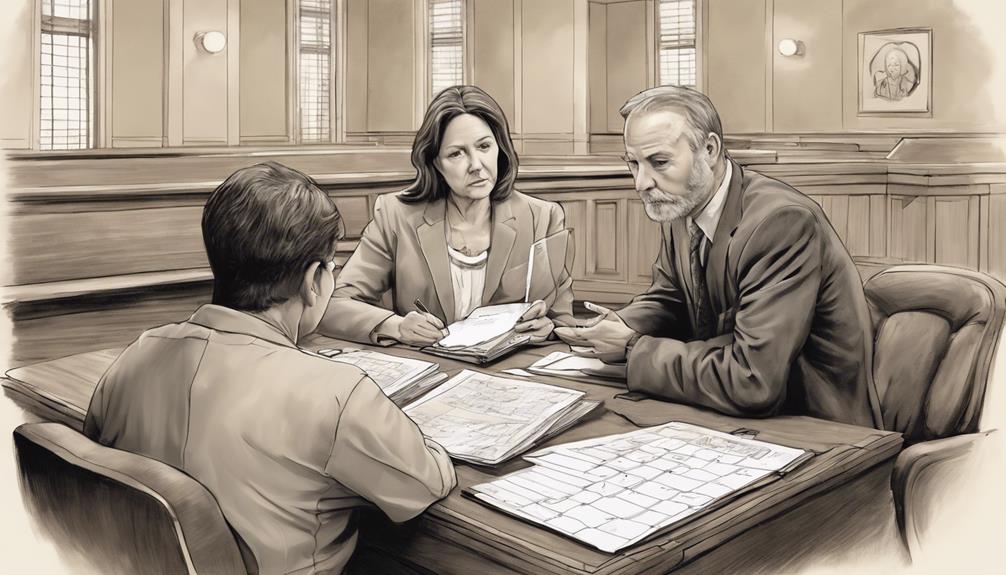You are going through a divorce in Arizona and are now questioning who will get custody of the children?
Well, let's just say it's a bit more complicated than flipping a coin.
Understanding the ins and outs of child custody in Arizona can be crucial in navigating the legal system during a divorce. From legal frameworks to types of custody arrangements, there's a lot to consider when it comes to ensuring the best outcomes for everyone involved.
Let's shed some light on this important aspect of divorce proceedings together.
Key Takeaways
- Legal decision-making and parenting time are determined based on the child's best interests.
- Arizona courts prioritize shared parenting responsibilities over sole custody arrangements.
- Parenting plans focus on the well-being and stability of the children during divorce.
- Mediation is mandatory to encourage cooperation and create amicable custody agreements.
Legal Framework for Child Custody in Arizona
In Arizona, our legal framework for child custody, now known as legal decision-making, emphasizes the responsibility of making major life decisions for the child. The term 'visitation' has evolved into 'parenting time,' reflecting a more inclusive approach to co-parenting after a separation. Arizona has shifted away from concepts like custodial and primary residential parents towards shared parenting responsibilities, highlighting the importance of both parents in the child's life.
When Arizona courts make decisions regarding legal decision-making and parenting time, the paramount consideration is determining the best interests of the child. Courts in Arizona prioritize crafting detailed parenting plans that cater to the child's well-being, including specific schedules and robust dispute resolution mechanisms to address conflicts that may arise. These parenting plans are meticulously designed to ensure that the child's needs are met while fostering a sense of stability and consistency in their post-divorce or separation life.
Factors Influencing Custody Determination

As we explore the factors influencing custody determination in Arizona, it becomes evident that the child's best interests, parental involvement, and the ability to provide a stable environment play crucial roles in shaping custody decisions.
Courts in Arizona consider various aspects such as the mental and physical health of the parents, any history of domestic violence, and the child's relationship with each parent when determining custody. The primary caregiver's role, the child's adjustment to home and community, and the willingness of parents to facilitate a relationship with each other are significant factors.
Additionally, parental cooperation, the child's preferences if mature enough, and the ability to promote the child's relationship with the other parent also impact custody determinations. Ultimately, Arizona courts prioritize the child's welfare, aiming to establish custody arrangements that serve the child's best interests in divorce cases. It's essential to navigate these factors with care and understanding to ensure the well-being of the children involved.
Types of Custody Arrangements in Arizona
When considering custody arrangements in Arizona, it's crucial to understand the distinctions between legal decision-making and parenting time.
Legal decision-making pertains to major decisions concerning the child's upbringing, while parenting time refers to the physical custody and time spent with the child.
In Arizona, courts have the authority to grant either sole or joint legal decision-making responsibilities based on various factors, including the child's relationship with each parent.
Sole custody grants one parent the exclusive right to make decisions about the child's welfare, education, and health, while joint custody involves both parents sharing these responsibilities.
The physical custody aspect determines where the child resides and how much time they spend with each parent. Understanding these different aspects of custody arrangements is essential for navigating the complexities of child custody proceedings in Arizona courts.
Parenting Plans in Divorce Cases

Crafting a parenting plan in Arizona divorce cases involves outlining custody arrangements and decision-making responsibilities to prioritize the best interests of the children involved. These plans are crucial as they detail how parents will share legal decision-making authority and parenting time, ensuring that the children's well-being remains at the forefront. Courts in Arizona actively encourage parents to collaborate in creating these plans, emphasizing the importance of reaching mutually agreeable arrangements.
Role of Mediation in Child Custody Disputes
In navigating child custody disputes in Arizona, mediation plays a pivotal role as a mandatory step in family law cases, offering parents a platform to resolve disagreements through the guidance of a neutral mediator.
During mediation:
- Parents can work together to create parenting plans that prioritize the well-being of their children.
- Communication between parents is encouraged to foster understanding and collaboration.
- The focus is on promoting cooperation to reach agreements that are mutually beneficial.
- Successful mediation outcomes often lead to more amicable and sustainable child custody arrangements.
Mediation provides a structured and supportive environment for parents to address their differences constructively, aiming to reduce conflict and find common ground. By actively participating in the mediation process, parents have the opportunity to shape the future care of their children in a way that's thoughtful and tailored to their unique family dynamics.
Frequently Asked Questions
Who Has Sole Custody of a Child in Arizona?
We have sole custody of a child in Arizona when one parent is granted exclusive legal decision-making authority. This parent makes major decisions for the child without consulting the other. The court decides based on the child's best interests, considering safety and parental fitness.
Can a Mother Keep Child From Father in Arizona?
Sure, we get it. In Arizona, both parents share custody rights until a court decides during divorce. A mom can't just keep a child from dad without a court-approved plan. Kids come first.
Can One Parent Keep a Child From the Other Parent Without Court Orders Arizona?
We must understand that in Arizona, one parent should not keep a child from the other without court orders. Doing so can lead to legal conflicts. Seeking legal guidance and following proper procedures is crucial.
How Does Arizona Decide Custody?
We decide custody in Arizona based on the child's best interests, considering factors like parental relationships. Legal decisions and parenting time are established during divorce. Courts may grant sole or joint legal authority, prioritizing the children's welfare and stability.
What Factors Determine Custody Arrangements During and After a Divorce in Arizona?
In Arizona, when considering custody arrangements during and after a divorce, the court must assess several factors. These may include the child’s relationship with each parent, the child’s adjustment to home, school, and community, and whether either parent is considering relocating with children after divorce.
Conclusion
In conclusion, navigating child custody during a divorce in Arizona can be complex and emotional. By understanding the legal framework, considering key factors, and working towards a fair parenting plan, parents can prioritize their children's well-being.
Remember, in the storm of divorce, we must be the calm in our children's lives, guiding them through the waves of change with a steady hand and a loving heart.










